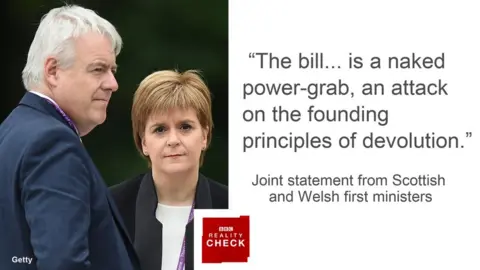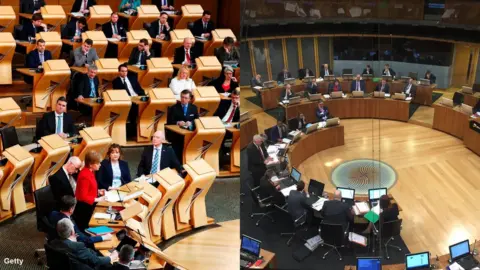Reality Check: Can Scotland and Wales block the repeal bill?
 BBC
BBCThe European Union (Withdrawal) Bill, known as the repeal bill, will convert EU laws into UK laws. Some of these will be in areas such as the environment and agriculture, which are normally the responsibility of the devolved governments in Scotland, Wales and Northern Ireland.
The First Ministers of Scotland and Wales, Nicola Sturgeon and Carwyn Jones, have described the bill as a "naked power-grab" that undermines devolution. But do they have the power to block it?
The UK government says it will negotiate with the devolved governments and attempt to seek consensus. Ultimately, though, the bill could pass even without the agreement of Scotland and Wales, but not without the potential for severe political consequences.
Devolution to Scotland, Wales and Northern Ireland transfers the power to make laws in some policy areas from Westminster to the Scottish Parliament, Welsh Assembly and Northern Ireland Assembly.
But there are times when the UK Parliament still legislates in these areas. The Sewel Convention states that when it does so, it should normally seek the consent of the devolved legislature.
And the convention is just that, a political convention, not a legally enforceable rule.
It is named after Lord Sewel, who first set it out when the Scottish Parliament was established.
A system was established whereby the UK government seeks a "legislative consent motion" from the devolved legislatures when it passes laws on devolved matters.

The convention was written into a memorandum of understanding between the UK and devolved governments in 2001.
It states: "The UK government will proceed in accordance with the convention that the UK Parliament would not normally legislate with regard to devolved matters, except with the agreement of the devolved legislature."
The memorandum was intended as a political agreement not a legally binding code. And the word "normally" implies it is not absolutely essential for Westminster to seek consent.
The convention as it applies to Scotland and Wales has recently been written into law.
The Scotland Act 1998 said the power of the Scottish Parliament to make laws "does not affect the power of the United Kingdom to make laws for Scotland". However, the Scotland Act 2016 inserted an extra clause saying that Westminster: "will not normally legislate with regard to devolved matters without the consent of the Scottish Parliament".
A similar clause for Wales was included in the Wales Act 2017.
There has been no such Act of Parliament for Northern Ireland, but the convention still applies there.
Brexit legal challenge
Despite the new statutory basis, the Sewel Convention does not give the Scottish Parliament or Welsh Assembly an absolute veto.
That was determined by the Supreme Court in its judgement in the case brought by Gina Miller about the triggering of Article 50, which started the Brexit process.
The Supreme Court found that the new clauses do not mean that the Sewel Convention has been converted into a legally enforceable rule. It remains a political convention - albeit one which is recognised as a permanent feature of devolution.
The devolved legislatures in Scotland and Wales do not have the legal power to block the repeal bill. But if the UK government were to bulldoze it through without their consent, it could be politically explosive.
It may just be a convention but it is regarded by many as a key aspect of the devolution settlement and an important part of the UK's constitution.



